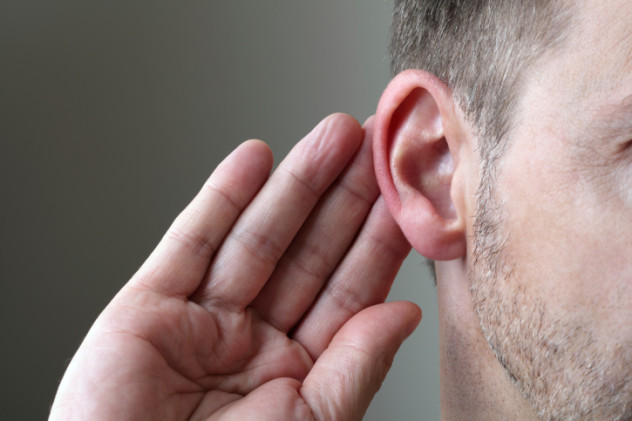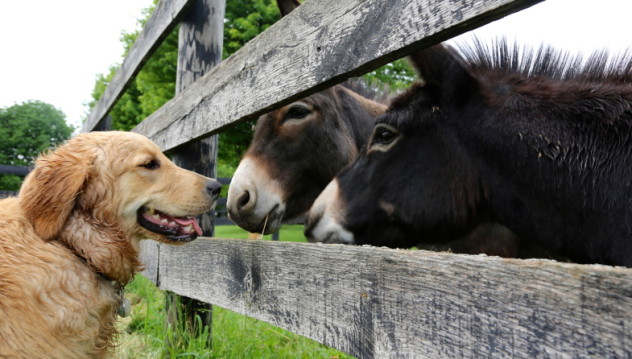 History
History  History
History  History
History 10 “Modern” Problems with Surprising Historical Analogs
 Health
Health 10 Everyday Activities That Secretly Alter Consciousness
 History
History Top 10 Historical Disasters Caused by Someone Calling in Sick
 Animals
Animals 10 New Shark Secrets That Recently Dropped
 Movies and TV
Movies and TV 10 Forgotten Realities of Early Live Television Broadcasts
 Technology
Technology 10 Stopgap Technologies That Became Industry Standards
 Weird Stuff
Weird Stuff 10 Wild Facts About Taxidermy That You Probably Didn’t Know
 Travel
Travel 10 Beautiful Travel Destinations (That Will Kill You)
 Miscellaneous
Miscellaneous 10 Modern Marriage Rituals Born from Corporate Branding
 History
History 10 Extreme Laws That Tried to Engineer Society
 History
History 10 “Modern” Problems with Surprising Historical Analogs
 Health
Health 10 Everyday Activities That Secretly Alter Consciousness
Who's Behind Listverse?

Jamie Frater
Head Editor
Jamie founded Listverse due to an insatiable desire to share fascinating, obscure, and bizarre facts. He has been a guest speaker on numerous national radio and television stations and is a five time published author.
More About Us History
History Top 10 Historical Disasters Caused by Someone Calling in Sick
 Animals
Animals 10 New Shark Secrets That Recently Dropped
 Movies and TV
Movies and TV 10 Forgotten Realities of Early Live Television Broadcasts
 Technology
Technology 10 Stopgap Technologies That Became Industry Standards
 Weird Stuff
Weird Stuff 10 Wild Facts About Taxidermy That You Probably Didn’t Know
 Travel
Travel 10 Beautiful Travel Destinations (That Will Kill You)
 Miscellaneous
Miscellaneous 10 Modern Marriage Rituals Born from Corporate Branding
10 Things We Just Don’t Know About Language And Communication
By the time we’re in school, we’re able to do it without even really thinking about it. It’s rare that we go through a day without using a handful of different types of communication. It’s so automatic that it almost seems like it’s hard-wired into us—and perhaps it is. There’s still a lot we don’t know about just how our ability to communicate through language came about, where it’s going, and when we’re finally going to be able to communicate with animals.
10When Do We First Recognize Words?

Babies aren’t born knowing how to speak, but they are capable of recognizing certain sounds. Studies done by the University of Helsinki have found that newborn babies will react to the sound of music that they were exposed to in the womb, and other studies have shown that babies that are regularly exposed to certain words—even made-up ones—will recognize these words and react to them once they’re born. This suggests that learning a language begins sometime in the third trimester of a pregnancy but, not surprisingly, testing the language abilities of a newborn baby has proven pretty difficult.
One of the experiments done on babies less than a month old (in order to try to determine whether or not they found words and sounds familiar) was having them suck on a pacifier that would, in turn, expose them to different sounds (a language that they weren’t familiar with). It was found that when the newborns heard words in their parents’ native language, they showed signs of being already familiar with the speech patterns.
We’re not sure just when the whole process starts, though, or how many of the language skills and memories that are created in the womb stay with the child after birth. We’re not sure if there’s any long-term advantage that babies will have if they’re exposed to speech and music while in the womb, or if it has the potential to help speed up a child’s language development.
9Bilingual Babies And The Brain

When a child grows up in a household that speaks one language and, at the same time, the child is going to school and speaking another language, it’s been suggested that processing the two different languages has some negative effects on the brain. Researchers have been taking a closer look at whether or not that’s the case, and while they’re pretty sure it’s not, they’re not sure what’s going on in the brain that allows it to separate the two languages.
Babies as young as four months old have been found to be able to tell which language is being spoken just by watching the person speaking. There have also been studies done that suggest that babies raised in a bilingual household can use the language switching skills they develop in other situations, like paying attention to other visual clues given off by speakers, that a monolingual baby might miss.
We have no idea how a baby’s brain learns the difference between one language and the other, though, or how the two languages develop side by side. We’re also not sure how long babies retain their ability to relate to language in a visual way. Researchers think that there are other benefits to being exposed to two languages on a regular basis before the age of about four, but they’re not sure what they all are.
8We Don’t Know How To Translate Anything Accurately

Translating something from one language into another is something that’s done pretty frequently, but researchers are beginning to find out now that it’s unlikely we’ll ever truly be able to translate something between languages with absolute accuracy. While there are some obvious hindrances to accurate translation—like how well the translator knows the languages in question—there are other issues, too.
For example, when researchers rely on other people to translate their work, it’s pretty easy for wrong words to get used and meanings to get changed. There’s also the idea that some words have pretty strong cultural meanings attached to them that, even if the translator is aware of them, they might not be able to accurately depict in the other language.
Some ideas are just defined in completely different ways in completely different languages as well. What one culture considers “freedom” or “civil rights” might not even be understood by another culture. While it might be possible to find words that convey the basic meaning of something, there are some ideas that are so deeply rooted into the emotional core of a culture—like “freedom”—that we’re not quite sure how to adjust for the cultural divide when it comes to translating between languages.
7We’re Not Sure How It Started

One of the most baffling questions about language and communication is how it all started—and we have no idea how the human race went from a state of having no language to having certain sounds that were put together and understood to mean certain things.
There are a couple of different theories on how it all got started. According to the religious theory, language was a divine creation, and it was given to mankind by God. This theory will never be able to be proven, aside from during the Second Coming.
There’s also the “ding-dong” hypothesis, that states that language started when we started giving words to occurrences based on their sound—“bang” for a loud noise, for example. From there, it’s suggested, languages got more complicated when we started assigning words based on other things, like function. The Basque word for “knife” literally means “ouch-ouch,” which seems legit. Detractors from the theory point out that there are a huge number of words that aren’t connected to their meanings in any such way. There are a few similar theories that suggest we’ve built our language on involuntary exclamations, such as a cry of pain or other vocalization, and another that we started speaking by imitating the sounds of the animals around us.
Another theory states that humans have evolved into a form that has a sort of language motherboard in our brains that developed language as a byproduct of who and what we are—the same as a dog will innately bark, we’re innately programmed for language. This one seems also pretty unlikely to ever be proven.
Charles Darwin had a guess, too, although he was never quite confident in it. Darwin suggested that we started speaking as a way of reinforcing hand gestures and other types of more physical communication.
The theories about how humans acquired language go on and on, but it’s also unlikely we’re ever going to be able to solve this one. There’s no real way to trace the history of our spoken language, and even though we know that our ancestors from 100,000 years ago didn’t have the vocal setup to speak as we do, that doesn’t mean that they didn’t have their own unique language.
6How Many Languages Are Lost?

We don’t know the answer, but we do know that the number is more than you’d think. Today, there are about 7,000 languages spoken across the entire globe; one of those languages dies approximately every 14 days, while other estimates suggest it’s more like one language every three months.
With seven billion people in the world, 78 percent of them speak one of the top 85 most popular languages. There are a number of languages where there are only a couple people left speaking them. As of 2009, there was one speaker of Bikya left in the world, and there are two people left who speak Lipan Apache. More than 1,000 languages are currently considered endangered, a sliding scale that depends on things like how many members of the next generation are being taught the language, and whether using it is an everyday thing or reserved more for special or ceremonial occasions.
This huge loss of languages is due in large part to the prevalence of mass communications. Even in the most remote village, once home to a unique dialect and their own language, people are forced to learn one of the big languages—English, Russian, Mandarin, or Spanish—in order to not only watch television and listen to the radio, but to trade with larger groups. Parents encourage more popular languages over smaller ones, wanting their children to be able to communicate with the world.
The idea of dying languages isn’t something that’s just happening in the remote corners of the world, either. In 2012, there were only a few people left in Oregon that were speakers of Siletz Dee-ni, and only a few Wintu speakers left in California.
5Can Human Language Describe God?

For the most part, human language is used to describe human things to other humans. When we start to talk about God, though, we run into a linguistic problem.
Many religions define God as infinite. Language, though, is very finite, and it’s argued that finite words, terms, and ideas can’t possibly be applied to something as infinite and as unknowable as God.
The problem goes a step further when you look at religious texts that hinge on the fact that they’re the absolute truth. In numerous religious traditions, there are sacred texts that proclaim to speak the truth about God. But, if our language is completely insufficient to describe the powerful and infinite that God is defined as, that makes all of the texts, songs, and teachings that so many people hold as sacred truths to be completely insufficient as well.
Since we’re not really sure how accurately our language can portray anything as infinite as we (attempt) to say that God is, that leaves believers faced with some pretty tough questions about how accurate their scripture really can be. Various philosophers have put forth answers to some of the questions and problems, including that it all indicates that any talk about God is inherently meaningless, while another says that language, words, and terms used in describing God are really all about your frame of reference.
4Why Haven’t We Decoded Animal Language?

Humans, as a whole, have a tendency to think they’re pretty intelligent—which brings up the question of why animals are so good at learning our language, but we’re so bad at learning theirs.
We’re still trying to understand what defines their language, and there are some scientists who insist that animals don’t package their communications into neat little words or vocalizations, and that there’s no language there to be learned. Dolphins are thought to be one of the most intelligent animals, and while some scientists are trying to figure out just how all their vocalizations fit together, others, like Justin Gregg, a researcher for the Dolphin Communication Project, says that they don’t have language (like we understand it) at all.
Pretty incredible evidence to the contrary has come from the most unlikely of species—the prairie dog. Researchers have not only been able to isolate certain calls and vocalizations and determine what they’re used for, but they’ve also been able to communicate back with the little rodents, playing back calls that have successfully alerted an entire group to the presence of danger. The whole question of why we haven’t been able to fully learn to speak, say, dog as readily as an English-speaker might learn Spanish also has a lot to do with status. It’s only now that some scientists are recognizing that language as we know it might not be an entirely human thing after all.
3We Still Don’t Know How Lying And Body Language Works

Language and communication aren’t all about the spoken word, and body language plays a massive role in the way we communicate with each other—knowingly or unknowingly. We usually like to think that we’re pretty good at interpreting people’s body language and, in some cases, we can be. But research has shown that we still have absolutely no idea how we should be teaching people to assess possible threats and catch dangerous people in a lie.
The Transportation Security Administration recently spent about $1 billion putting thousands of its agents through extensive training that was supposed to teach them what they were looking for when it came to spotting people who were lying. They were learning things like looking for specific behavioral tics that were supposedly associated with lying, and even though they were later found to be more confident in their abilities, they were no better at identifying people who were actually lying than civilians with no training at all.
Studies reviewed in connection with the program showed that people were only about 47 percent likely to tell whether or not a person was lying. When they were asked to decide if people were telling the truth, that rose to about 61 percent. Still, the training about reading the body language of a liar was about as effective as randomly guessing. While it’s long been held that you can tell when a person’s lying by reading body language, like looking away or looking to the right, there isn’t any evidence to support that idea.
Now, the idea that there’s a concrete link between expressions and what’s going on inside our heads is starting to fall out of favor, with experts saying that the best way to tell if someone’s lying is to listen to them. We’re all culturally accustomed to concealing our true feelings for a good part of the day. After all, we grin and bear it at work and, sometimes, at home.
2The World’s Oldest Written Language Is Still Undeciphered

We think we’ve found what’s likely the world’s oldest written language, but we still have absolutely no clue what it says.
Usually, a large part of the problem in decoding ancient writing happens when we only have a few sources available, but that’s not the case with proto-Elamite, as we have more than 1,600 different texts. Used in the handful of centuries around 3000 B.C. in what’s now Iran, the language is thought to date back to the invention of writing—which happened around 1,000 years before. Strangely, even though it’s been linked to the written language of the nearby Mesopotamians, the proto-Elamites seemed to have chucked the whole thing in the bin and started from scratch.
A cryptic series of symbols etched into hardened clay tablets, the language has remained stubbornly undeciphered in spite of years of study and a huge amount of documentation. Lately, linguists at Oxford University are taking another shot at it in a crowd-sourced project where they’re hoping to enlist the help of the public to help crack the code of the dots, dashes, and shapes. Using state-of-the-art technology that’s letting them analyze even the smallest of marks on the clay tablets, they’ve been able to isolate 1,200 individual signs—but they still have no clue what the signs mean.
Part of the problem, they think, is that most of the writing samples we have aren’t all that carefully done. Many of the symbols they’ve cataloged might just be mistakes, and they suspect that it eventually got so bad that no one could read what others had written even then, and the world’s first written language might have just been rendered useless.
1Why Did English Miss Out On Describing Smell?

English is a pretty extensive language, and it’s one of the most commonly spoken languages in the world. That’s why it’s so surprising that there’s a whole facet of the world that it’s just incapable of handling. Describe how a lemon smells. Or how vanilla smells, or how gasoline smells.
Once you try to do it, you realize that it’s harder than you think. There are simply no real words in the English language that can be used to accurately describe a certain smell to the point where another person would be able to tell exactly what you’re talking about. And that’s a weird thing that a language as complete as English just missed the boat on describing smells.
Especially when you consider that those who speak the Malaysian dialect Jahai, and other closely related languages, have a series of words that evoke smells just like we have words that allow others to picture an exact color or taste. While in English we often resort to saying that something smells like something else, that doesn’t really get our point across. In Jahai, there are words for the bloody smell that comes from raw meat, which is entirely different from, say, the bloody smell that comes from a dead squirrel.
When English speakers were asked to smell a scent and describe it, the results were often long, rambling, and not at all exact. Jahai speakers, on the other hand, can accurately describe a scent in a world that captures everything about it, so listeners know exactly what they’re talking about.
How English missed this, we’re not sure, but it’s such a gaping hole in communication that, for a long time, we just thought smells were indescribable. They’re not—we just don’t know how to do it in English.








